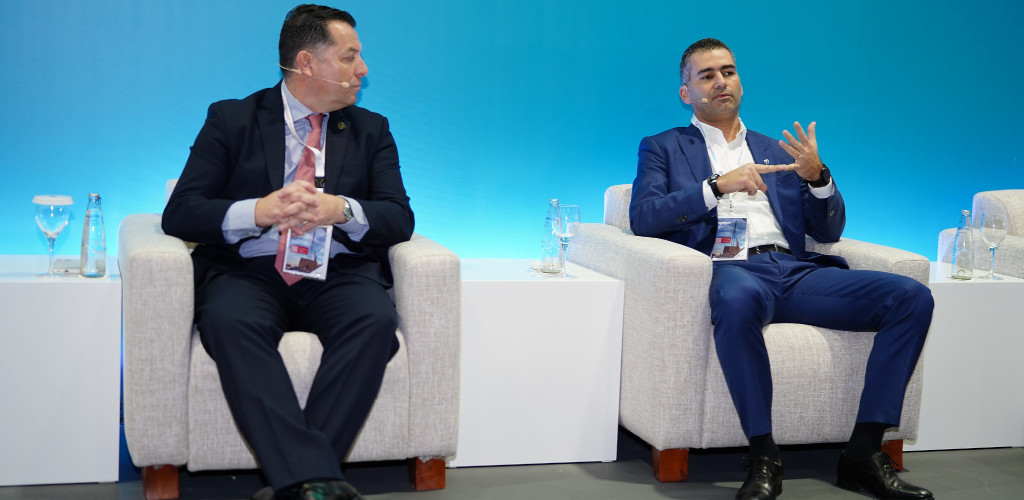Feb 13 | 2023
Kingdom Dubbed “Biggest Construction Site in World”

By Simon West
The buildout of “giga projects” is driving Saudi’s bid to shake up its fossil fuel-dependent economy, providing breakbulk and project logistics with a potentially huge source of cargo-carrying opportunities for years to come.
The emergence of these gargantuan infrastructure projects is part of Saudi’s Vision 2030 masterplan to pivot the kingdom away from oil and gas towards more sustainable, private sector-driven industries.
NEOM, Saudi’s US$500 billion “smart city” on the Red Sea Coast, is one of the stand-out projects making serious headway: a 26,500-square-kilometre business and logistics zone housing ports, industrial plants, sports stadiums, green energy facilities and a hi-tech, 170-kilometre-long smart city dubbed The Line.
“What we have been able to see up to now is really the layout of the foundations of massive giga projects,” said Philippe Verdeure, managing director for projects (Asia-Pacific and Middle East) at Sarens, during a Saudi Spotlight panel discussion at Breakbulk Middle East.
“NEOM, for example, is now digging foundations and laying out all the groundwork to make it possible. In addition, we have already seen the Red Sea Project becoming extremely real – they are on schedule to open up their first hotel rooms and tourist destinations by next year.”
.jpg) The Red Sea Project is a luxury eco-tourism and hospitality project being built over 28,000 square kilometres of pristine lands and waters along Saudi’s west coast. The project, funded by Saudi’s Public Investment Fund, or PIF, will eventually comprise 50 hotels and 1,300 residential properties across 22 islands and six inland sites.
The Red Sea Project is a luxury eco-tourism and hospitality project being built over 28,000 square kilometres of pristine lands and waters along Saudi’s west coast. The project, funded by Saudi’s Public Investment Fund, or PIF, will eventually comprise 50 hotels and 1,300 residential properties across 22 islands and six inland sites. Alexandre Joseph, VP of strategic business development at Bahri Logistics, said that Saudi’s economy was moving at “1,000 miles-per-hour”.
“Opportunities can be found everywhere, but you need to be close to the clients on the ground,” he said. “Main EPCs are signing huge contracts, and it is not just the Americans, or the British or the Europeans – it is everyone. Koreans are there, Japanese are there, Chinese are there.”
“Saudi is the biggest construction site in the world,” Verdeure added.
Also on the panel, Igor Muniz, CEO and executive director at Erhardt Saudi Arabia spoke about his company’s involvement in the kingdom’s infrastructure drive.
In January, Erhardt announced a Saudi joint venture with oil and gas-focussed Erog for the transport of project cargo in the Middle East. The new company – Erhardt Projects for Logistic Services – will be based in the eastern city of Al Khobar, one of the busiest logistics hubs in the Persian Gulf.
“The country is very focussed – they have very clear targets.”
Joseph, meanwhile, underlined the ease of doing business in Saudi Arabia vis-à-vis just a decade ago. The government has done away, for example, previous rules requiring foreign companies to have a local partner. “The government listens to us, they try to support us as much as they can. The ministry of transport and logistics gathers us at the end of every month to discuss about the issues we are facing.”
Still, the sheer speed of the buildout and the enormity of so many giga projects happening at the same time means the kingdom could lack the capacity to keep pace with plans.
For Verdeure, the country will need support from surrounding countries, mainly in the GCC. “But also from further afield – India and Southeast Asia for fabrication mostly, and also European and American expertise in engineering and development.”
Muniz pointed to a potential shortfall in warehousing and other real estate assets to support development.
“Storage is going to be an issue,” the executive said. “We need to plan as soon as possible and anticipate with the EPCs and the companies that run logistics on how we find solutions and how we can devise a contingency plan. Storage will be one of the big challenges that we are going to face, especially in the region of NEOM.”
Verdeure also urged more investment in port infrastructure to cope with the massive influx of goods and materials in the coming years. “There is also a strong push to really facilitate everything to do with permitting – everything that is necessary for a project to be completed at government level.”
“I give the example of Dubai. When Dubai really had its growth in the early 2000s up to the late 2000s, what we saw was a real government push, a streamlining, to make sure those projects would be executed and that they got the attention they needed at a legal and government level.
“That is something that still lacks a little bit in Saudi Arabia. But I am quite sure it will be resolved in the coming period.”
The session in Dubai was moderated by Nasser Al Qadi, commercial director for industrial projects at DHL Global Forwarding.
Check out our post-session interviews with the panellists:
